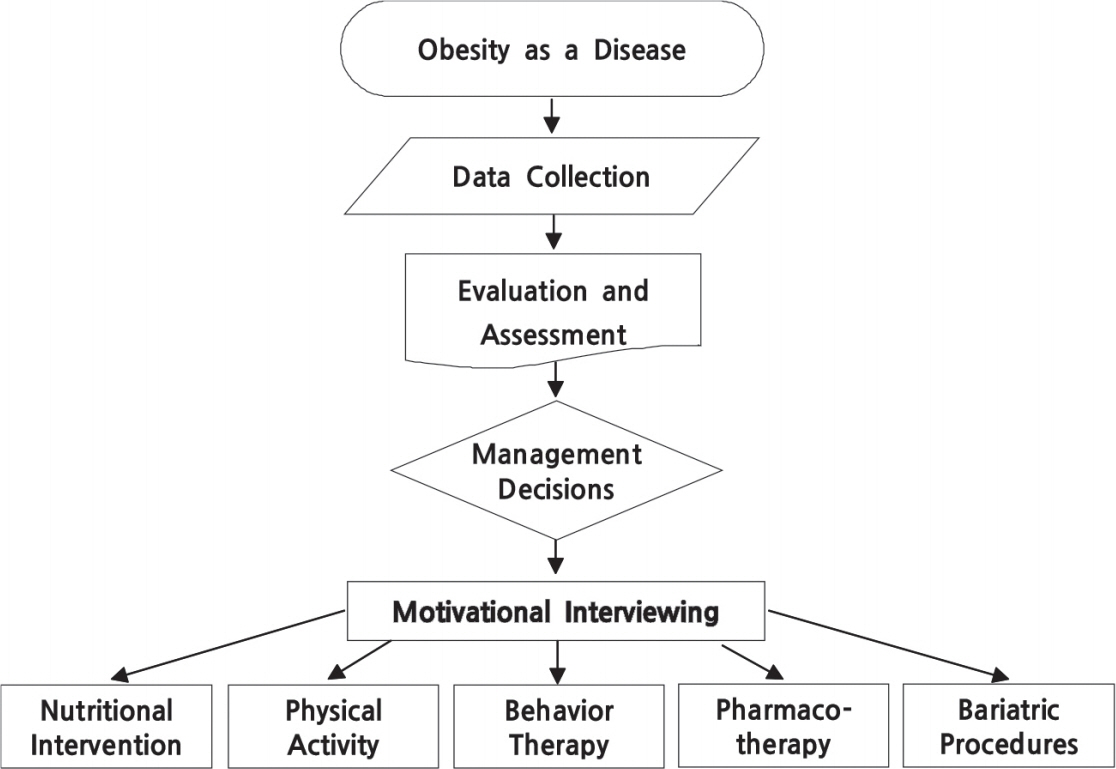J Korean Diabetes.
2020 Sep;21(3):166-171. 10.4093/jkd.2020.21.3.166.
A Strategy for Integrating Behavioral Therapy and Motivational Interviewing for Motivation Enhancement in Patients with Obesity
- Affiliations
-
- 1Department of Social Work, Kyung Hee University Medical Center, Seoul, Korea
- KMID: 2507049
- DOI: http://doi.org/10.4093/jkd.2020.21.3.166
Abstract
- Motivation enhancement is important in behavioral therapy for patients with obesity. Depending on the clinician's communication style, the patient's motivation level may change. Motivational interviewing helps clinicians interact with patients effectively. The purpose of this article was to introduce how to integrate motivational interviewing into obesity behavioral therapy.
Figure
Reference
-
1. Korean Society for the Study of Obesity. 2019 Obesity fact sheet. Seoul: Korean Society for the Study of Obesity;2019.2. Korean Society for the Study of Obesity. Guideline for the management of obesity 2018. Seoul: Korean Society for the Study of Obesity;2018.3. National Heart, Lung, and Blood Institute; National Institute of Diabetes and Digestive and Kidney Diseases. Clinical guidelines on the identification, evaluation, and treatment of overweight and obesity in adults: the evidence report. Bethesda, MD: National Institutes of Health;1998.4. Jensen MD, Ryan DH, Apovian CM, Ard JD, Comuzzie AG, Donato KA, et al. 2013 AHA/ACC/TOS guideline for the management of overweight and obesity in adults: a report of the American College of Cardiology/American Heart Association Task Force on Practice Guidelines and The Obesity Society. Circulation. 2014; 129(25 Suppl 2):S102–38.5. Bays HE, McCarthy W, Christensen S, Tondt J, Karjoo S, Davisson L, et al. Obesity algorithm. Denver, CO: Obesity Medicine Association;2020.6. Durrer Schutz D, Busetto L, Dicker D, Farpour-Lambert N, Pryke R, Toplak H, et al. European practical and patientcentred guidelines for adult obesity management in primary care. Obes Facts. 2019; 12:40–66.
Article7. Steinberg MP, Miller WR. Motivational interviewing in diabetes care. New York, NY: The Guilford Press;2015.8. Moyers TB, Martin T, Manuel JK, Miller WR, Ernst D. Revised global scales: motivational interviewing treatment integrity 3.1.1. Available from: https://casaa.unm.edu/download/miti3_1.pdf (updated 2010 Jan 22).9. Moyers TB, Manuel JK, Ernst D. Motivational interviewing treatment integrity coding manual 4.1. Available from: https://casaa.unm.edu/download/miti4_1.pdf (updated 2014 Dec 1).10. Armstrong MJ, Mottershead TA, Ronksley PE, Sigal R J, Campbell TS, Hemmelgarn BR. Motivational interviewing to improve weight loss in overweight and/or obese patients: a systematic review and meta-analysis of randomized controlled trials. Obes Rev. 2011; 12:709–23.
Article11. Barrett S, Begg S, O'Halloran P, Kingsley M. Integrated motivational interviewing and cognitive behaviour therapy for lifestyle mediators of overweight and obesity in community-dwelling adults: a systematic review and meta-analyses. BMC Public Health. 2018; 18:1160.
Article
- Full Text Links
- Actions
-
Cited
- CITED
-
- Close
- Share
- Similar articles
-
- Using Motivational Interviewing in Diabetes Self-Management Education
- Motivational Enhancement Therapy and Cognitive Behavioral Therapy for Alcohol Use Disorders
- Motivating Children and Adolescents in Obesity Treatment
- Using Motivational Interviewing to Overcome Psychological Insulin Resistance
- Development and Effectiveness of Motivational Interviewing-Cognitive Behavioral Therapy integrated Counseling Program for Reducing Suicidal Ideation



